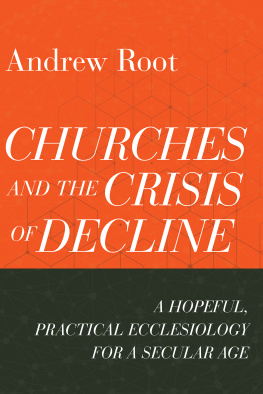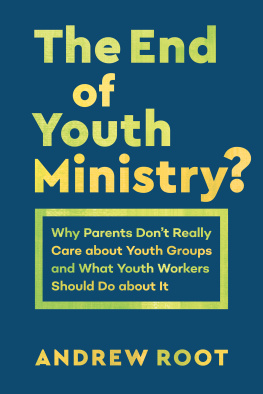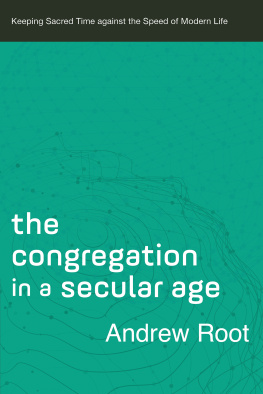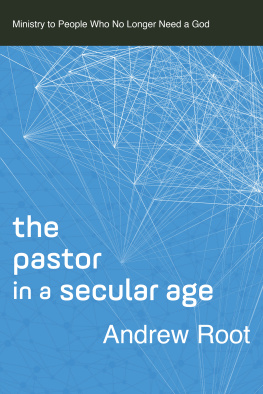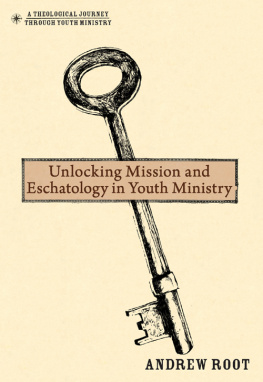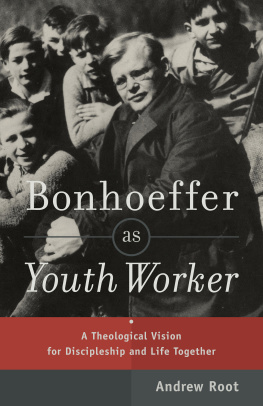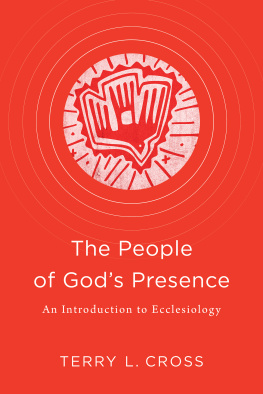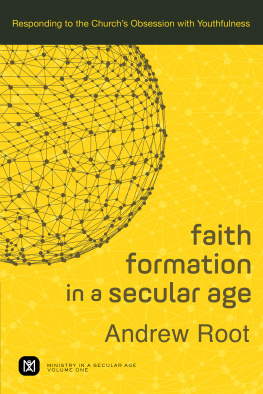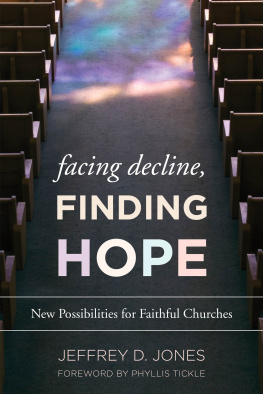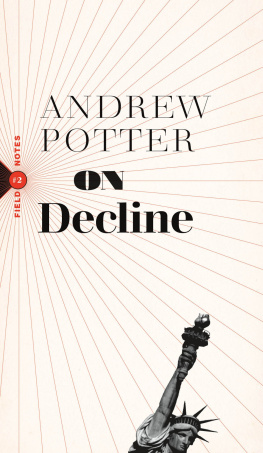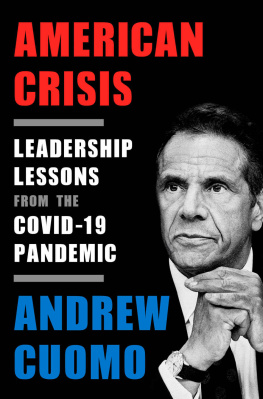1. When the Church Becomes a Pub, and the Immanent Frame Our Map
2. Brother Trouble and Meeting the Exorcists Son: The Beginning of Karl Barth
3. A Funeral for a Churcha Funeral That Remakes a Church
4. An Apple Tree and the Incoherence of God Is God
5. The Church Cant Know How to Find God
6. The Church Is Not the Star of Its Own Story
7. Welcome to Crisis Mode
8. Wedding Blunders and Brotherly Love
9. Say Goodbye to Being and Give Me More Busyness
10. A Shady Obituary and the Need to Wait
11. Waiting Sucks but Resonance Is Life
12. Waiting Is Living: The Church and Resonance
13. When Mozart Goes Straight Into and Through You
15. A True Ghost Story and the Birth of Watchwords
16. Getting Real with a Dialectical Demand
17. Deepening the Dialectic: Avoiding Sledgehammering the Ceiling
Preface
The first draft of this book was composed in lockdown. Yep, its a COVID-19 lockdown baby! As an introvert who is an avid indoorsman, I thought I was built for quarantine. But that ended up not being the case. I found it difficult, haunting, and at times depressing. To keep the darkness from getting to me, Id drag myself out of bed earlier than usual to type away at this project. It helped. I spent my evenings watching TV (well, honestly, that was no change from before COVIDTV is kind of my jam). There were a few highlights to the hundreds of shows I watched during the months of lockdown.
Maybe it was the COVID effect, but I found myself falling deeply for Dark , a mind-bending German show about time travelers. Its like if Lost had a cool German cousin who smoked cigarettes, was tatted out like Lil Peep, quoted Schopenhauer, and listened to emo rap. Its good! All the time travel is so confusingly awesome!
Another quite different highlight was Hamilton . My family was one of the millions who streamed it on Disney+ on the Fourth of July. I liked it more than I thought I wouldor was willing to admit to my wife and kids. (Okay, I loved it! But I played it cool because I didnt need the I told you so refrain.)
This book is a little like those shows: part time travel saga, part contemporary musical update to a historical figure (without the music and costumes). I figure if Lin-Manuel Miranda can make Alexander Hamilton interesting, I can do the same for Karl Barth (I know, the hubris!). Im not under any delusion that there is a musical future for this book. Im not even suggesting that this book will be wonderfully entertaining (Id take mildly ). But I have tried to retell the story of Karl Barth in a way that looks more deeply at his ten years as pastor. Ill explore whether Barths early theology gives us any helpful ways of thinking about the church and how his early theology calls us to address and live within the secular age we have inherited. I ask the reader to recognize that my focus is on Pastor Barth. I want to show how the great Karl Barth must be seen as a pastor.
This is where time travel comes in.
As my earlier projects (particularly the Ministry in a Secular Age series) have sought to show, we are living in a time when its much harder to point to, and therefore build communities around, robust articulations of Gods action in the world. The church and its local congregations appear to be in a crisis. We keep interpreting this crisis as the loss of people and resources, but its really the radical transformation of belief itself. I contend, and I hope to show, that Pastor Karl Barth saw this in the early twentieth century. What Barth didnt have was Charles Taylors deep description of modernity. Barth intuited much of this, but he didnt have Taylors articulation of the immanent frame in particular (a culturally imposed map or frame we receive from culture that leads us to see things as mostly, if not completely, natural and material). Though Barth didnt have this language or description, the immanent frame was what Pastor Barth was seeking to address. Barth, through his pastoral ministry, was seeking to offer a new modern pastoral theology that could address the immanent frame. What Ill do in this book, all-time-travel-like, is import Taylors descriptive language from the early twenty-first century back to Karl Barth in the early twentieth. Doing so will no doubt cause some jaggedness, but Im trusting that it will be helpful. Ultimately, this book hopes to show that Pastor Karl Barth is a modern theologian addressing the immanent frame. Further, I hope that uncovering how Barth made a case for a living God inside this immanent frame can inspire the imagination of pastors and the congregations they lead.
The point of this book is not to offer a case for Karl Barth. The books point is not even to make Karl Barth the gravitational center of the project. Instead, I hope that in using Barths story I can offer some of my own theological construction. This book is a thought experiment that desires to present a constructive practical ecclesiology that draws inspiration and direction from Barthnot unlike Lin-Manuel Mirandas objective to not offer a historically defensible case for Alexander Hamilton but instead access Hamiltons story to push the imagination of his audience. To offer my own constructive ecclesiology, Ill be putting Barths story and thoughts in conversation with others like Erich Fromm and Hartmut Rosa. To be clear, this project is not necessarily intended for those studying Barth but for those pastoring churches in a secular age. My objective in telling Barths story is to explore what his theology means for the life of the church in our time and how it gives us a different vision for the church in a secular age framed in immanence.
Alongside Barths story, I tell the story of a fictional local congregation. That fictional church closed, and the building became a microbrewery, but I will offer an alternate history, retelling their story to see what might have helped them find the life they needed to remain active. Ive done this kind of fictional storytelling before to flesh out theological ideas. I suppose in some way its become a genre Ive embraced. It fits well into what Barth himself called irregular dogmatics. Ill admit its irregular to use this kind of storytelling, particularly in the academic guild, but I think its advantageous. Since the beginning of my career, my focus has been on the church in its most concrete form. Ive had the privilege of giving thousands of presentations to churches and church leaders. Ive discovered that the best way to teach theology in the church is not through intricately laying out theologians doctrinal differences but through stories of concrete people encountering a living God. Pedagogically, its best to show , not tell , people theological ideas. Thus Ive shaped this theological project around stories (showing).

